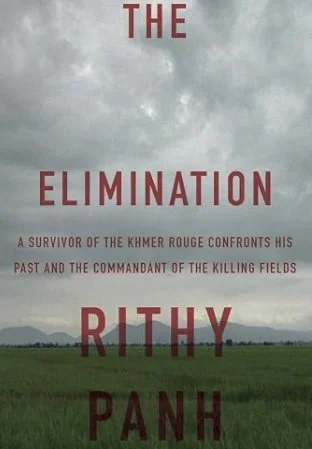The Elimination by Rithy Panh with Christophe Bataille, translated by John Cullen (Other Press) ~Janet Brown
Rithy Panh’s childhood ended when he was thirteen, when the Khmer Rouge changed Cambodia overnight. He “walked barefoot for four years,” watched his father commit suicide by refusing to eat, and saw his mother borne away in an oxcart, never to glimpse her again. He learned that “survival was our first duty,” and stripped of “his name, his family, his face,” he discovered that “nothing is more real than nothing.” As the Pol Pot regime began to crumble under a Vietnamese invasion, he led fifteen children, orphans who were no older than seven or eight, away from the fighting, slowly advancing toward safety. Astoundingly, he found his only surviving sister and with her made his way to the Thai border and a refugee camp. Two of his brothers had gone to France before Pol Pot took power and Rithy and his sister joined them.
When the Khmer Rouge leaders faced a tribunal, Rithy, now a filmmaker and writer, spent months in a jail cell, interviewing the man known as Comrade Duch. Duch had been the head of S-21, the Phnom Penh high school that had been turned into a torture center “where no one escaped death.” Under his leadership, 12,380 people were photographed, tortured, and died.
Rithy finds “a man of memory, fluent in “the language of slaughter,” who says of the people who died under his direction, “They were at the end of the line. They were already corpses.” On a list of prisoners, next to the names of three young children, Duch has written the instructions “Grind them into dust.” He orders the draining of all the blood from living bodies to be given to wounded soldiers at the front. In one case he gives the puzzling and horrifying order of “moderately hard torture.” He says that he never dreams, while he “incessantly draws mounds of skulls.” It was, he claims, his duty to follow orders.
For the Khmer Rouge “there was no moral law,” Rithy says. Educated men killed the educated class because “the closest followers of Marxism are the illiterate…Elimination was the goal.”
Duch spent his life moving from one belief system to another, from Buddhism to Marxism to evangelical Christianity which he believes has given him another life. He laughs and smiles as he’s interviewed, clinging to the belief that “the blood debt must be repaid with blood.” In his case and that of other Khmer Rouge leaders, this doesn’t happen. Pol Pot dies in his bed within a jungle encampment. Duch and the others die in prison cells.
They died victorious, Rithy claims, with their erasure of the dead. Only those who survived stand as memorials to the years of starvation and torture. While accepting the concept of the “banality of evil,” Rithy ends by extolling the “banality of good” that’s inherent in everyday life and is “inerasable,” a “work in progress…the human world.”
